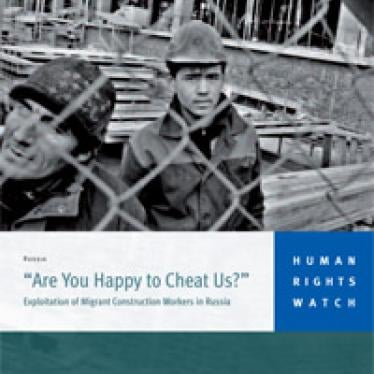(Moscow) – The Russian government should refrain from singling out any ethnic population for expulsion and ensure that any detentions and expulsions of foreigners have a legal basis, Human Rights Watch said today. According to media reports, Russia’s Federal Migration Service has said that it has detained several hundred migrant workers from Tajikistan since late last week and plans to expel many of them.
Russian media and organizations working with migrants say the measures happened in the wake of the conviction of a Russian pilot by a court in Tajikistan on November 8, 2011, for crossing the border illegally and transporting contraband. The court sentenced two pilots – Vladimir Sadovnichy, a Russian, and Aleksei Rudenko, an Estonian – to eight years in prison.
“The government has the right to deport foreigners who break migration or employment laws, but it needs to adhere to international rights standards,” said Jane Buchanan, senior Europe and Central Asia researcher at Human Rights Watch. “Singling out any one group of foreigners would not only be illegal, but would riskinflaming xenophobia and violence against people who don’t look Slavic, which is already all too common in Russia.”
In recent days Russian media and organizations working with migrants in Russia have reported a concerted effort by Russian law enforcement to detain and expel migrant workers from Tajikistan. The Federal Migration Service claims that the detentions are routine efforts to root out unlawful migration.
Experts estimate that between 1 and 2 million migrant workers from Tajikistan are in Russia, out of a total of between 5 and 10 million migrant workers. Experts have documented significant contributions to Russia’s economic growth and prosperity through its reliance on migrant workers, who very often do the low-paid and dangerous jobs that many Russians refuse. Migrant workers and other migrants are highly vulnerable to xenophobic attitudes and attacks and to racial profiling by police.
Russian officials have also cited public health concerns as a reason for stricter immigration policies. Interfax, the largest Russian news agency, quoted Gennadii Onishenko, Russia’s chief medical officer and the head of the head of the consumer safety watchdog Rospotrebnadzor, as saying on November 14 that migrants from Tajikistan have high rates of HIV and tuberculosis, and suggesting that Russia consider a “ban on using migrant workers from [Tajikistan] until the country can establish at least minimal public health standards.”
According to the Joint United Nations Programme on HIV/AIDS (UNAIDS), 0.2 percent of adults in Tajikistan were infected with HIV, or approximately 9,000 people. By contrast, one percent of adults in Russia are estimated to be infected, and nearly 1 million people are believed to be living with HIV. According to the World Health Organization, Russia has the third-highest rate of tuberculosis of all countries in Europe and the former Soviet Union, after Moldova and Romania. In 2009, the last year for which data are available, Russia had 89 new tuberculosis cases per 100,000 people, compared with 82 in Tajikistan. Russia has been criticized internationally for its high costs for HIV treatment and its ineffective approach to drug resistant tuberculosis and drug dependency treatment.
“Instead of putting in place effective HIV and tuberculosis programs that would reduce transmission and protect all Russians, the government is blaming migrants from Tajikistan.” Buchanan said. “The Russian government is proposing to increase funding to its neighbors to fight HIV and tuberculosis, but it shouldn’t couple that idea with irresponsible rhetoric against migrants that will increase discrimination.”
Human Rights Watch has criticized other governments, including the United States, South Korea, and South Africa, over immigration policies based on foreigners’ health that violate human rights.
Russia has targeted ethnic groups for expulsion in response to political conflicts in the past. In 2006, after a customs dispute with Georgia, the Russian government expelled thousands of ethnic Georgians, including some who were Russian citizens. The Georgian government has challenged the deportations by lodging a complaint with the European Court of Human Rights.
“We’ve seen Russia use targeted deportations in retaliation for political disputes before, and they do a lot of damage to the people expelled,” Buchanan said. “Governments need to settle their political disputes through diplomatic channels, not by endangering people who have nothing to do with these disputes.”







